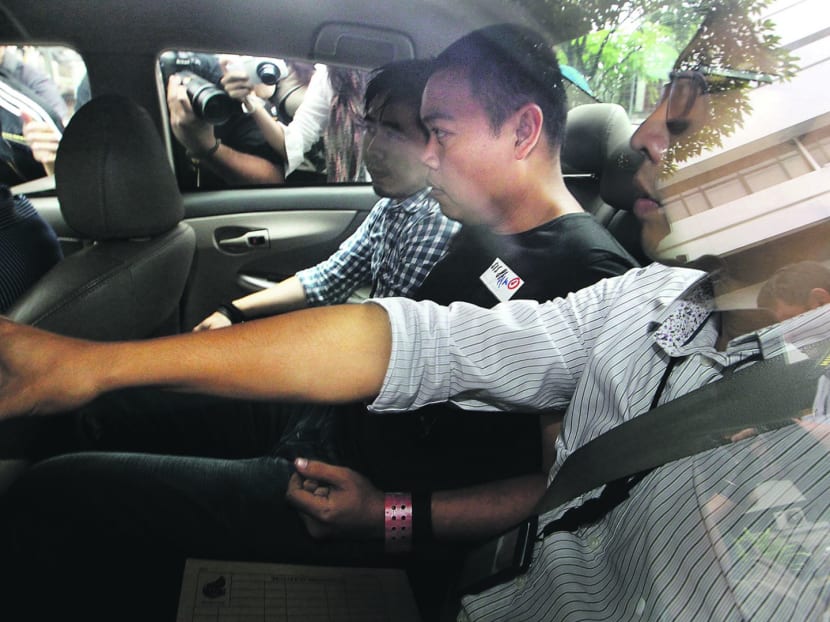Former police officer to hang for Kovan double murder after appeal is denied
SINGAPORE — Former police officer Iskandar Rahmat’s appeal against the death penalty for a 2013 double murder was thrown out on Friday (Feb 3) by the Court of Appeal, which ruled that premeditation was not the crucial element to prove the offence — rather, it was the fact that he had turned aggressive and intended to cause death.

The Kovan murder suspect Iskandar Rahmat leaves the Subordinate Courts on July 15, 2013. TODAY file photo
SINGAPORE — Former police officer Iskandar Rahmat’s appeal against the death penalty for a 2013 double murder was thrown out on Friday (Feb 3) by the Court of Appeal, which ruled that premeditation was not the crucial element to prove the offence — rather, it was the fact that he had turned aggressive and intended to cause death.
Even if his incredible account of a rob-and-run ploy were true, any right of self-defence belonged to the younger victim, who came home to the sight of his slain and bloodied father on the floor, the judges said.
Intention to murder “need not be pre-planned or premeditated, and can be formed on the spur of the moment”, stressed the apex court, which comprised Chief Justice Sundaresh Menon and Judges of Appeal Chao Hick Tin and Andrew Phang.
The judges also found that whether the murder weapon, a knife, originated from the elder victim’s house, where the killings took place — a key contention that Iskandar had relied heavily upon at trial — was “immaterial”.
“It is undisputed that (Iskandar) had used that knife to inflict the injuries on (both victims), and if (he) had the intention to cause death at the material time, then that is the end of the matter,” the judges said.
The shocking double murder dominated headlines, especially after Iskandar, then an active police officer, was named as the suspect.
On July 10, 2013, the body of Tan Chee Heong, then 42, was dragged along Upper Serangoon Road under a silver Toyota Camry, shocking passers-by. The bloody trail led back to 14J Hillside Drive — about 1km away — where the body of his father, Tan Boon Sin, 67, lay, with multiple stab wounds.
Iskandar had claimed that he had intended to rob and run, but was forced to fight off a knife-wielding elder Tan to protect himself, and Tan died from his injuries during the scuffle.
The judges dismissed this argument, noting that Tan’s wife had testified that he was “not a violent person”. They were also unconvinced that Tan had assaulted Iskandar after seeing through his ruse. “Furthermore, Tan must have known it would not have been an even fight.
He was a 67-year-old man with a chronic knee problem … who, up to that point, believed (Iskandar) was a police officer performing his duties,” said the judges.
Even if Iskandar’s story was true, there was a “reasonable opportunity” for him to try and run out of the house to seek help but he did not, the judges noted. “Instead, the appellant chose to stay and wrestle with (Tan), and when he managed to gain control of the knife, he brutally stabbed (Tan) in vulnerable areas multiple times.”
Iskandar’s claim that he did not realise the knife was still in his hand when he attacked the younger Tan was also “incredible”, said the judges. “Even if his claim is to be believed, (he) should have realised (this) after the first stab. Yet … he proceeded to stab (the younger Tan) in the neck a few more times,” they added.
The father-and-son pair sustained 40 wounds on vital parts of their bodies, as opposed to the sole deep laceration wound found on the back of Iskandar’s right hand. The prosecution had previously pointed out this was “totally disproportionate” to someone who was acting in self-defence.
Throwing out Iskandar’s claim of alleged self-defence against the younger victim, the apex court agreed with the High Court judge’s finding that any right of private defence would belong to Tan, not Iskandar.
“(The younger Tan) had just witnessed (Iskandar) lowering his father’s limp and bloodied body on the floor. Furthermore, (Iskandar), who was much heavier than (Tan), was still holding on to the knife at the time. It would have been only natural for (Tan) to try and apprehend (Iskandar) and defend his father,” the Court of Appeal ruled.
It also rejected Iskandar’s defences, brought up only during his appeal last year, that he was suffering from adjustment disorder and acute stress reaction during the killing.
The judges questioned why Iskandar had not reported these psychiatric symptoms when he was assessed in 2013. On the contrary, he stated that he did “not have any health or mental-related issues” and had “never felt a need to consult a psychiatrist”. It was “highly unsatisfactory” to rely on a new psychiatric report “so late in the day”, three years after the murder, the judges added.
“Accused persons should and are expected to put their best case forward at the earliest time possible. Indeed, this court might exercise its discretion to reject such drip-feed applications in the future,” said the judges.
Iskandar learned his fate on Friday on his 38th birthday, with more than a dozen of his family members in the packed public gallery — including his parents and sister — taking turns to bid a tearful farewell to him after the hearing ended. His family members declined to speak to the media.
When contacted, the elder Tan’s daughter Josephine Tan told TODAY: “We trust the honourable judges with their equitable verdict ... We are still trying to accept reality.” ADDITIONAL REPORTING BY VALERIE KOH









